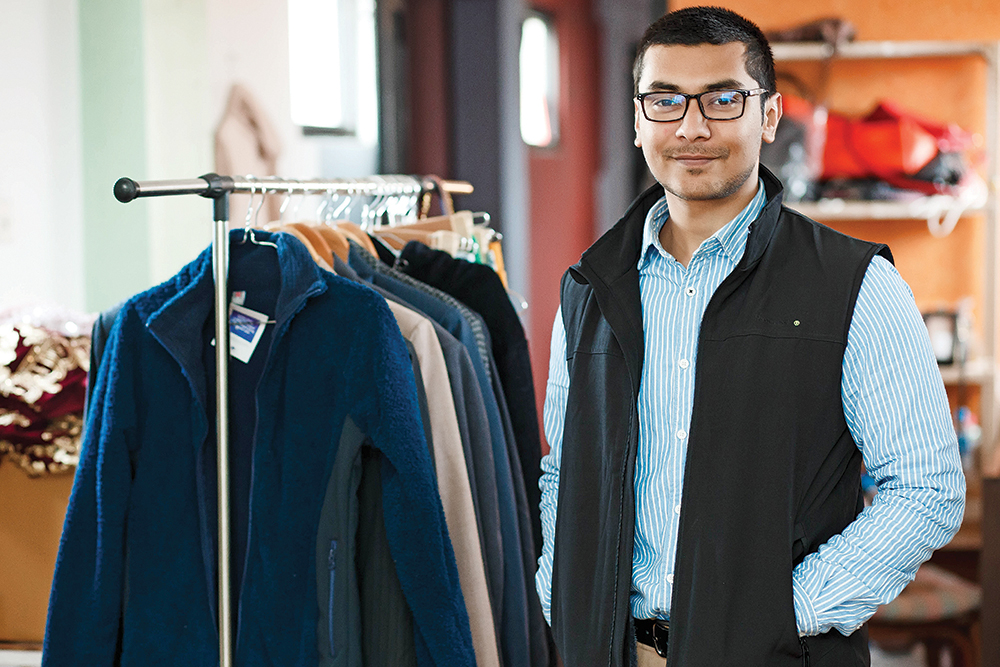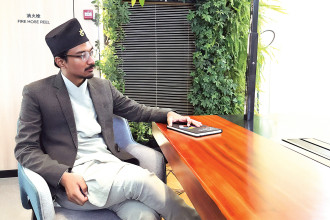
MANISH JUNG THAPA
FOUNDER & CEO, ANTIDOTE
Innovation is usually born out of necessity. It was no different for Manish Jung Thapa, Founder and CEO of Antidote. It was during the lockdown imposed by the government to curtail the spread of the Covid pandemic that he got the idea of starting Antidote which is a marketplace for pre-loved apparel, accessories, books, bags and shoes. “During the lockdown, we were at home most of the time with nothing much to do and when I looked around the house, I realised there were so many things lying around which were of literally no use to us,” Thapa recalls. He then decided to sell all the unwanted stuff through Instagram which lay the seeds for him to establish Antidote. Thapa says most people do not realise the sheer volume of items they own but do not use on a day-to-day basis. “I personally had no clue about how, why and when I bought some of the items I owned and I am pretty sure if you look around in your room and calculate the worth of each item that you have not used since God knows when, your jaw will drop,” he states. The other aspect which struck him was that if we could only reintroduce half the items back into the ecosystem, it would essentially halve the demand for brand new items. “This substantially reduces the demand for scarce resources that goes into making it. We knew from the onset that this idea, if and when done right, can fundamentally change how we buy and consume,” he elaborates on the core philosophy of his venture. “The space for this type of business is so huge and the upsides are so incredible that it almost seems ‘unreal’ that no one has ventured into it already,” says Thapa.
However, there were many challenges, he reminisces, with the biggest being getting the process right as they didn’t have the luxury to learn from the mistakes of a similar business in Nepal. “We have till date tested a lot of different models, fine-tuned our processes a lot of times, and have gone through numerous trials and errors which can at times really wear you out,” he says. In addition, convincing the first set of buyers and sellers was not without its own challenges. While talking about business, he says that the starting is always difficult. “I personally think starting and running a traditional business in Nepal is to an extent, simple. It’s just that sometimes the purview of policies does not encompass tech-enabled businesses adequately,” he elaborates. What he thinks to be the bigger problem for business owners is ‘work ethic’. “We need a lot of catching up to do in terms of how we approach ‘work’. If we still remain complacent, the world will pass us by; it already has in so many ways,” he says. The ability to adjust and adapt is what can make the difference between success and failure, says Thapa. “We started and raised our seed round as a clothing rental business for weddings and special events but the pandemic had us pivot our model,” he explains, adding they had to fundamentally change the business model due to the pandemic as people no longer required outfits for weddings. “We saw a dip in sales by up to 90% and that for a business just starting off with meagre cash reserve meant only one thing – ‘quick death’. We had to take the call, either pivot quickly and stand a chance to survive, or die,” he recalls.
At present, Antidote serves two user groups – sellers and buyers. Thapa shares their sellers are working women, especially bankers and expats/development workers, whereas their buyers range from a high school student in Nepalgunj to a doctor in Kathmandu to a trekker about to summit Everest. “Referrals have worked wonders for us. We enjoy a model where our buyers turn into sellers and vice versa. This brings in huge network effects and we have been fortunate that it has panned out great for us; at one point we were acquiring new users for as less as Rs 50,” he states. He further adds it is not about just starting a business and operating it but being able to provide an experience to the customers. “Our technology stack enables our sellers to sell 5x faster than your regular thrift or consignment store or classified marketplace, which I think has to be our USP,” he clarifies. “In the past two years, we have fine-tuned our operations and processes in such a way that will help us scale more rapidly than most of the businesses in our sphere,” he says. One of the beauties about a technology-enabled business, says Thapa, is that once you fine tune it and make it work in one region, the world’s your oyster. “More than half of the entire population lives in this part of the world and three out of the six most populous countries lie in Central and South Asia; it is not an overstatement to say that if we crack it here, under the right circumstances, we can take it regional,” he shares. A former Teach for Nepal Fellow and United States Youth Council member, Thapa also teaches Entrepreneurship at King’s College. With a keen love for reading, understanding technology, politics and human behaviour, he is currently tinkering with writing too. When asked what propels him, he candidly says, “The biggest life lesson for me has been to hold myself accountable and take complete ownership of events that unfold in my life, no ifs and no buts. Lastly, keep the breadth of your knowledge far and wide.” READ ALSO:
- Tekka: Changing Lives One Stitch A Time
- ‘Edusanjal is determined to make Nepal an education hub of Asia’
- Mitahara: Food Is Medicine
- Birthing An Idea






